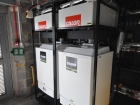Fuel for thought

If you are specifying a boiler for a building that is off the mains gas grid, then take some time to consider the fuel options. There are a number of myths that are simply not true warns Keith Higginson of Calor Gas.
There are very few investment decisions that will affect a business’s bottom-line costs for the next 15 years. Replacing the boiler is one — and with rising energy prices an ongoing issue, it is worth doing some research, especially if the premises is not on the mains gas grid.
For businesses in these areas, it is not simply a question of weighing up the capital costs and efficiency of the boiler, you also need to take into account the differences between the fuels available.
Let’s begin by exploding the biggest myth. Many people believe that LPG is more expensive than oil, when in fact a significant proportion of our business customers pay less for their energy than comparable oil users. Electric heating tends to be more expensive than both.
And this is not a temporary price blip; our average commercial price for LPG has been approximately 15% cheaper on a pence per kilowatt hour basis than the average price of large oil customers — as reported in DECC’s ‘Prices of fuels purchased by manufacturing industry’ report, which is published quarterly. This price differential has remained consistent since before 2011.
All this means that for the first time an energy company can guarantee that for commercial customers the price of LPG from Calor Gas will be cheaper than a customer’s current oil price on a pence per kilowatt hour basis. The aim of the campaign is to break the oil versus LPG price myth once and for all.
Looking further ahead, global fuel prices will rise over time, but LPG prices will probably increase at a slower rate. New fuel sources from technologies such as fracking plus the opening of new oil/gas fields, means that the future for LPG pricing over the next 20 to 30 years is comparatively very good.
Of course the price of fuel is front of mind when making a decision between LPG and oil, but there are a number of other factors to consider.
While there is an ongoing debate about boiler efficiency for different fuels, what is certainly true is that a lot of research and development is invested in gas-fired boilers and associated technology because most of the country uses gas as its primary fuel source.
For off-grid customers LPG is the main beneficiary of such investment, with new technology such as Blades Low Carbon Systems’ combination server gas boilers (with passive flue-gas heat recovery) improving operating efficiency in heating mode to 97%. For the customer, such technological advances are seen in its fuel bill.

With oil prices rising, another risk to consider is theft. Not only does this leave the business without fuel for heating, but there is the cost of replacing the lost oil.
The most serious consequence of oil theft to a business, however, is the threat of spillages, which can also occur as a result of leakage. Cleaning up oil spillages is difficult and can be very expensive, with the Environment Agency stating: ‘On average an oil spill costs a typical business up to £30 000 in fines, clean up charges and production losses.’
In contrast, it is virtually unheard of and technically very difficult to steal LPG from a tank — and it does not pollute soil, air or water.
Obviously a leak could be serious for a business’s balance sheet, but it will also be detrimental to its public relations — both locally and, potentially, nationally.
With corporate social responsibility vital in rural areas, it is also worth noting that apart from natural gas, LPG is the cleanest burning off-grid fossil fuel for CO2, sulphur oxides, oxides of nitrogen and particulate emissions. Indeed it is cleaner than any of the combustible renewables, resulting in healthier local air. This makes it the logical low-carbon backup fuel to renewable technologies.
Specifying a heating system is major long-term investment for most commercial businesses and one that does not occur very frequently.
For years it has been assumed that oil is the cheapest fuel available for off-grid commercial businesses. This is no longer true, and I believe that for the lifetime of the boiler, switching to LPG will yield significant savings due to both the trend in the cost of fuel and efficiency gains associated with modern LPG technologies. Add in the facts that fuel theft is unheard of, there is no risk of pollution and that it offers large CO2 savings, and the case for switching to LPG should be clear-cut.
Keith Higginson is commercial marketing manager for Calor Gas.







